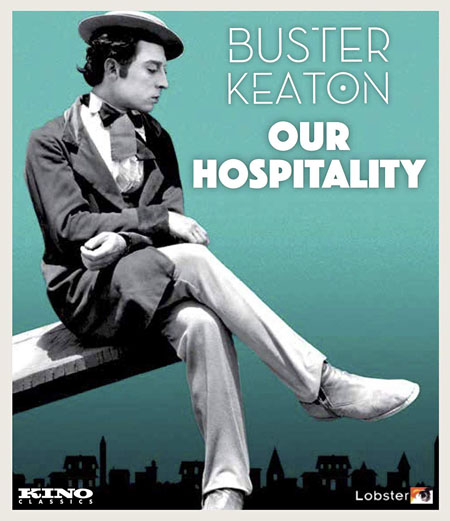
“KEATON’S
FIRST MASTERPIECEâ€
By
Raymond Benson
Although
Buster Keaton had starred in two feature films (and directed one of them), it
wasn’t until the release of Our Hospitality in late 1923 that he
established himself as a major force of cinema to rival the likes of Chaplin.
Of course, he had already starred in and directed numerous shorts, all of which
served to build his reputation—but it is this beautifully-rendered silent
classic that is considered the auteur’s first masterpiece.
The
story takes place in the early 1800s and draws upon a rural family feud like the
Hatfields and McCoys—in this case the McKays and Canfields. When patriarch John
McKay is killed by James Canfield (and vice versa), Mrs. McKay flees with
little baby Willie McKay (played by Buster’s real-life infant son, Buster
Keaton Jr.). Twenty years later, Willie inherits the old family estate in the
south and returns to claim it, only vaguely aware of the feud that has existed
for decades. On the way he meets Virginia (played by Keaton’s wife at the time,
Natalie Talmadge), who happens to be a Canfield. Upon arrival at home, Willie
continues to court Virginia, but her brothers won’t have it. The rest of the
picture is a cats-and-mouse game of Willie avoiding being killed and at the
same time wooing the woman he wants to marry.
There
are many striking aspects about the picture. Keaton’s paid great attention to
detail in the design and location shooting. Apparently, he took great pains to
create realistic locomotives and tracks that depicted early train development
in America (although he played with time period accuracy for the sake of more
interesting visuals). The final act contains some spectacular and hair-raising
stunt work by the star, including an incident of falling into rapids and almost
drowning on camera. Mostly, though, the story is well-constructed, the
characters have more depth than in the other silent comedies of the day, and,
in the end, Our Hospitality is one of Keaton’s most satisfying movies.
Interestingly,
it’s the only Keaton film to feature three generations of Keatons—Buster
himself, his previously-mentioned son, and his father, Joe Keaton, as a train
engineer.
Kino
Classics presents a beautiful grey and sepia-toned 1920x1080p restoration with
a 2.0 stereo soundtrack and a score composed and conducted by Robert Israel. A
fascinating audio commentary by film historians Farran Smith Nehme and Imogen
Sara Smith accompanies the feature. Supplements include a rare 1947 short, Un
duel à mort (A Duel to the Death) starring Keaton; The
Iron Mule, a short from 1925 that Keaton produced (uncredited) and features
some of his locomotive creations; a featurette on the background of Our
Hospitality with Serge Bromberg; and an excellent featurette on the scoring
of the film, narrated by Robert Israel. The booklet contains an essay by
Jeffrey Vance.
Our
Hospitality
is yet another superb release from Kino Classics, a highlight in the fabulous
filmography of the inimitable Buster Keaton.
CLICK HERE TO ORDER FROM AMAZON